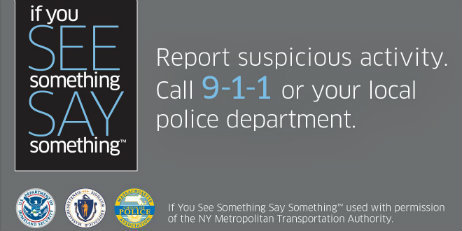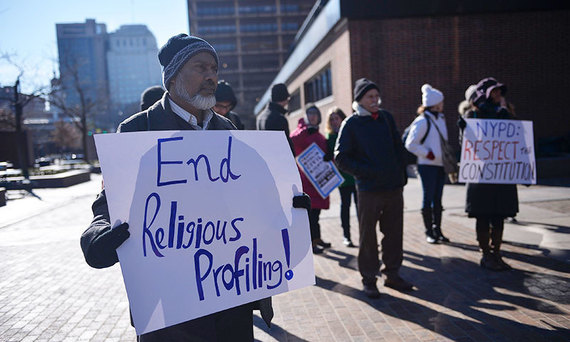 One of the several types of signs that can be found on subways, in airports, and in public places in the United States, urging civilians to "report suspicious activity." Photo courtesy of Mass.Gov
One of the several types of signs that can be found on subways, in airports, and in public places in the United States, urging civilians to "report suspicious activity." Photo courtesy of Mass.Gov
Last July, just four days after the attacks on Ataturk International Airport in Istanbul, I was about to leave Boston Logan Airport for a trip overseas with a layover in Istanbul. With the recent airport attack and the host of attacks that had occurred over the preceding months, I was a bit uneasy and a lot more aware of my surroundings. While waiting for my flight at Logan Airport, I kept hearing announcements about a security awareness program called SAFE (Security Awareness for Everyone), which urges passengers to report any suspicious behavior. As a Middle Eastern woman of color, I tend not to engage in these vigilante programs because people of my ethnicity and race are disproportionately considered "suspicious" and are typically the victims of such initiatives. But with all of the recent attacks in mind, I decided to scan the crowd at Boston Logan looking for anything or anyone that looked like a possible threat.
While searching the crowd for potential terrorists, I saw an older man with brown skin wearing a long heavy coat. I got nervous for a minute. Who wears long coats in the summer? Is he hiding something? Moments later, I looked back at him again and saw that he had small children and that he had nothing under his coat. I sighed with relief, but then I made a troubling realization: Because of my fear, I had deemed an innocent man a potential threat solely based on the color of his skin and his attire. I had racially profiled and made stereotypical assumptions, allowing my fear to dominate my perception of an individual who looked like my family, my community, and me.
 A group of individuals protesting a counter-terrorism initiative in New York, which has been believed to racially profile Muslims. Photo courtesy of Reuters.
A group of individuals protesting a counter-terrorism initiative in New York, which has been believed to racially profile Muslims. Photo courtesy of Reuters.
There's no denying that programs like SAFE disproportionately target individuals of Middle Eastern descent and Muslims. In July, a Muslim man was removed from an American Airlines flight because the flight attendant thought his name was "suspicious." A Muslim Pakistani couple was also removed from a Delta Airlines flight in July for looking "suspicious" simply because the wife was wearing a headscarf and her husband was sweating. These are only some of a long list of examples of brown, Middle Eastern, and Muslim people being profiled on flights, but this suspicion goes beyond airports. Individuals of color, especially those who look Middle Eastern, are targeted in subways, public places, and on the street.
However, when the facts are examined, more Americans have been killed by American shooters than by jihadist terrorists over the last ten years. In 2015, toddlers were involved in 52 shooting deaths in the United States compared to 19 by Islamic terrorists. This is not to say that there has not been an increase in the attacks committed by Islamic extremists. However, the media systematically labels Muslim attackers as terrorists while failing to describe similar attacks by other groups as acts of terror. White males have committed 64% of shootings in the U.S. since 1982, but white men are never called terrorists. They are called lone wolves and/or their mental health is evaluated. White supremacist Dylann Roof killed nine African Americans at a church in South Carolina in order to start a "race war" and Robert Lewis Dear shot 11 and killed three people at a Colorado Planned Parenthood. Despite the political and horrific nature of these attacks, the media never referred to these white men as terrorists or to all white men as national security threats. Conversely, the media continues to stress that brown people are suspicious and are more likely to be terrorists.
In designing SAFE, MassPort, the port authority that manages airports and other transportation facilities in Massachusetts,
Engaged the airport community in focus groups to learn employees' security concerns and what motivates people to be vigilant, and to design the most effective reward system. [They] learned that intrinsic motivation is the most powerful motivator, which is why the program does not use monetary incentives.
According to MassPort, this "intrinsic motivation" of fear is what allows the program to run without having to monetarily reward participants. How can a program built on people's fears and intrinsic motivations lead to rational and prudent outcomes?
SAFE and other "See Something? Say Something" programs perpetuate a culture of fear. Fearing fellow passengers, passersby, or community members and assuming the worst about them isn't healthy or productive. This culture of fear singles out individuals and certain groups of people, contributing to the xenophobia, Islamophobia, and ultra-nationalism that terrorist groups, like the self-proclaimed Islamic State, are using to their advantage. Islamophobia fits these groups' narrative about the West, particularly the United States, hating Islam, and it isolates targeted individuals. According to an article by The Nation, Islamophobia "provoke[s] Western governments into clamping down on their own Muslim populations, [...] driv[ing] them into ISIS's arms."
Therefore, programs like SAFE, which exacerbate fear and perpetuate xenophobia, are not effective in ensuring the safety of civilians. While it's important to be aware of one's surroundings, falsely accusing our neighbors, members of our communities, and fellow Americans of being "suspicious" based on the color of their skin, their religion, the language they speak, or their ethnicity is not going to put an end to terror; it has and will continue to make it worse.